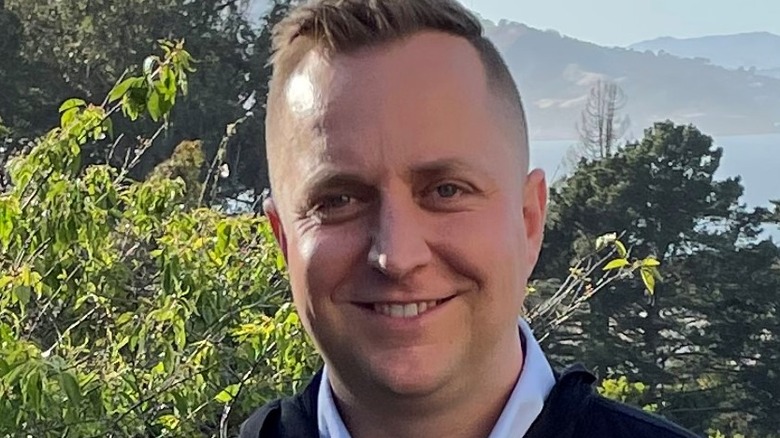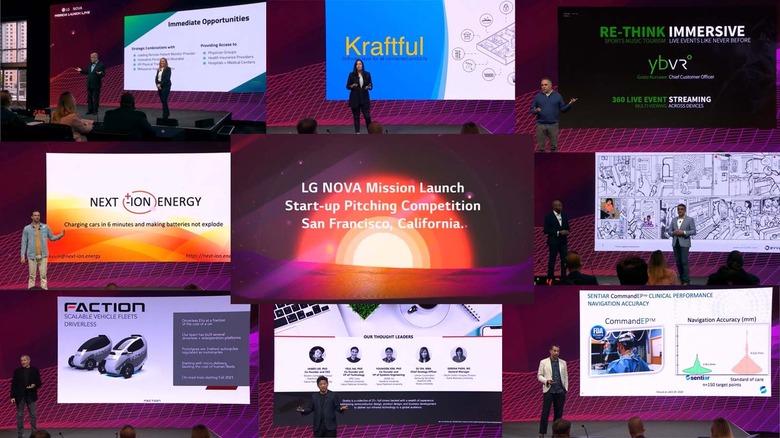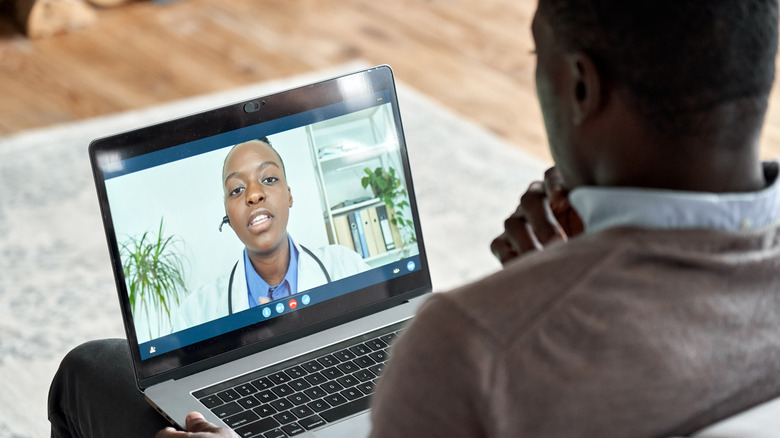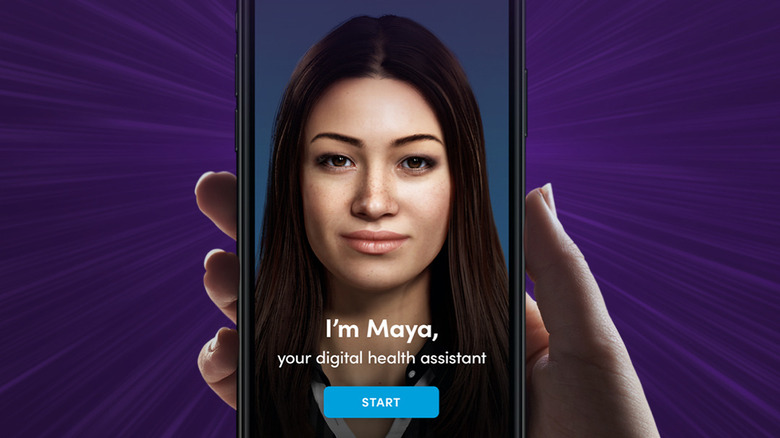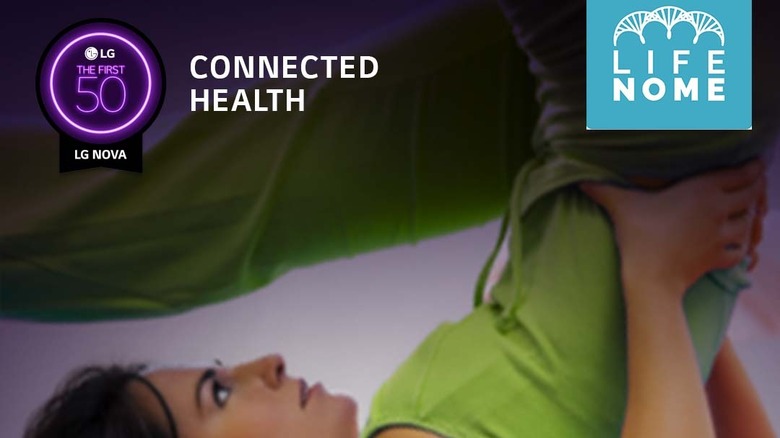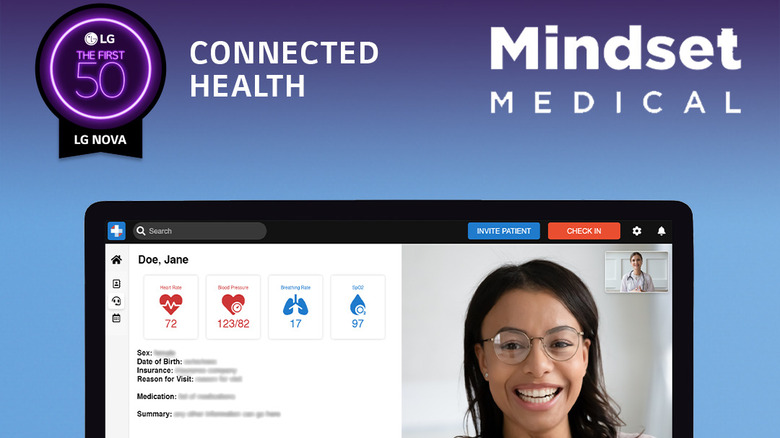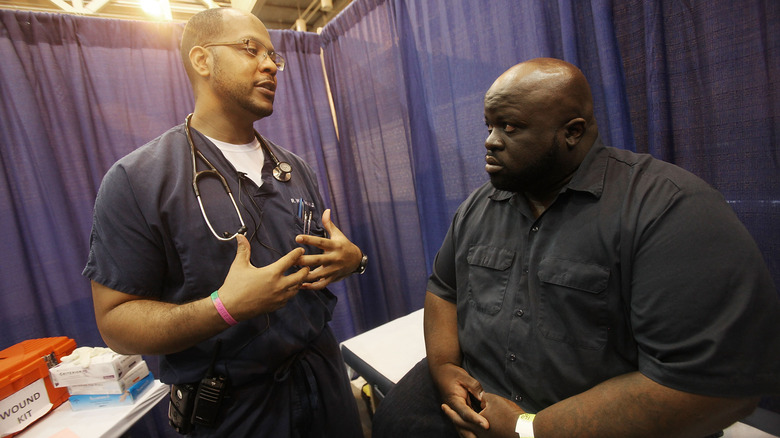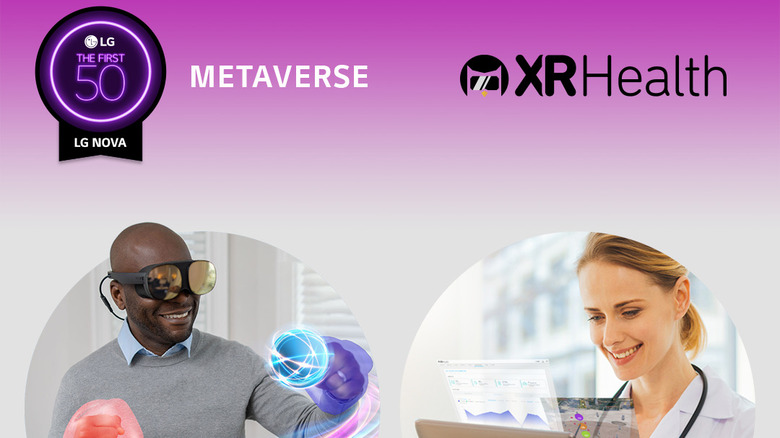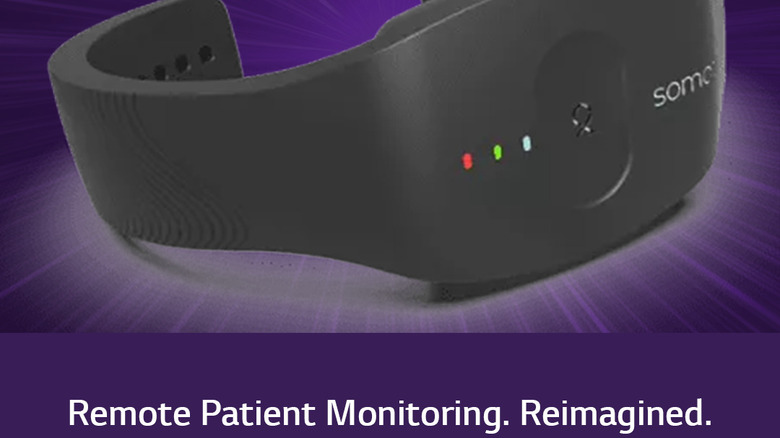LG NOVA's Joshua Di Frances On The Future Of Healthcare Technology - Exclusive Interview
When the COVID-19 pandemic hit in March of 2020, the healthcare industry had to abruptly adjust the entire way that it provided services to patients. Within weeks, doctor's appointments shifted from in-person to telehealth, and the shift was not smooth. Platforms like Zoom and Google Hangouts, which many businesses started using, weren't HIPAA compliant. The few telehealth-specific companies that did exist helped doctors all over the world shift to this new model of care as best they could, but even the best telehealth platforms couldn't compensate for the fact that doctors couldn't examine patients in person.
This problem sparked a massive wave of innovation in the healthcare technology industry. Every major company in the industry shifted their focus to finding solutions for the limitations of the current telehealth platforms. How could doctors examine patients remotely? How could they collect patient data like vital signs without seeing the patient in person? How could patients really connect with their doctors through a camera phone or a webcam?
According to Joshua Di Frances, the Head of Incubation at LG NOVA, a few healthcare tech startups have found the answers to those questions and more. In an exclusive interview with Health Digest, Di Frances talked about the tech that could soon be a part of your doctor's appointments, how technology is changing healthcare, and what a remote doctor's appointment could look like in the future.
LG NOVA's innovation mission
Can you tell us a little about what you do at LG NOVA and what kind of projects you're working on?
[At] LG NOVA, what we're doing is, we're focused on bringing in technology. LG NOVA is a new innovation site center based in Silicon Valley, and we want to work with the startup and entrepreneur community to innovate, to create impactful technologies that will lead LG and its partners, and the world into the future. We initially kicked off with this "mission to the future” challenge. It's focused on looking externally, looking at the startup community, engaging with them and the innovation ecosystem, and bringing them in and identifying new innovative technologies.
We have a couple areas in particular that we're interested in: digital health or connected health, we started with connected health, we're changing the title to digital health, but that's a big area. Energizing mobility is another one, thinking about EV and EV infrastructure moving forward, smart lifestyle, thinking about our connected ecosystem. At LG, we have a strong consumer presence and a strong presence in the home and [regarding] how we can leverage that to improve people's lives. Metaverse is another track of innovation for impact.
That's a bit at a high level of what we're doing, but we want to help LG think about the future and transition into these new, exciting areas and to create business in these areas that we believe will not only have impact, but will also ensure that the future of LG is in a really exciting direction.
Pandemic innovations
One of the things that you've probably been very much involved in is the tech in the healthcare space and how that's had to change because of the pandemic. Could you tell us a little bit about that?
I've been in digital health for a while and been at the intersection of technology and healthcare. Before I jump into LG, I'll share a little bit about some of the broad changes in healthcare recently. I was in digital health, probably starting around ... I started out in biotech. I have a neuroscience background. I started in biotech with genetic engineering startup, gene editing startup, mostly for research purposes using technology called CRISPR.
Then, I ended up going to Mass General Brigham, which was the leading healthcare center at the beginning of digital health to bring digital health into the healthcare system, and help our amazing researchers at Harvard medical school commercialize technology. From there, I went to CVS health, [focusing] on, similarly, bringing digital health into CVS. [I] then [moved into] government, most recently, before LG.
I've been in digital health [since] early on when it emerged, and the adoption was slow. We all knew that the future of healthcare was technology enabled. There was huge potential, but the adoption was really slowing. The interesting thing about the pandemic, as horrible as it was, if there's any kind of silver lining, it is that it really dramatically jumped digital health years ahead. There was the adoption of digital health. I believe it increased 80x what it was at the beginning of the pandemic and leveled off at about 38x. It made people much more comfortable with using technology, which opened the door to what could be done.
LG Nova sees that as an opportunity. We have a strong brand, we have a strong presence in the home, and we have a lot of devices that individuals use. We think that there's an opportunity to leverage this ecosystem, to deliver ... help, [continuing] to move the needle in healthcare and shift things. And ultimately deliver more impactful, accessible, affordable, equitable health.
That's high level, but the whole focus when we think about our specific focus in healthcare, we're all about improving quality of life with solutions for accessibility, mobility, usability, connectivity ... whether it's home or work or school or life, [all] while building the next generation of products, applications, and services for consumers.
We selected connected health, both because of the changes in healthcare, but also, often healthcare and wellness are deprioritized. We think creating unique access to healthcare and more opportunities for wellness is something where we can have an impact on people's lives. A little bit about how we're doing it: LG recently announced a partnership with Amwell around telemedicine, which is one of the major telemedicine companies ... It will help physicians better care for patients in hospitals, but we also, as we see healthcare moving towards a home, we're working with a number of startups right now that are focused on delivering better healthcare and more accessible healthcare into the home for consumers.
Adapting to telehealth
You touched on, already, how the pandemic kind of put everything for healthcare tech in high gear. Can you give us some examples of the innovation that was particularly driven by the pandemic, especially in the realm of telehealth?
Interestingly, there's been a lot of really interesting companies for years. It's not like, all of a sudden, all these interesting companies came out of the woodwork. The fact that there wasn't adoption, the adoption was low, made some of these business models more difficult for these healthcare startups that were focused on delivering better healthcare and helping health make that dramatic shift that we need to make. The rapid uptick in adoption helped on that front.
It also helped make consumers much more comfortable with using telehealth, with using chronic disease management platforms or health coaching apps and a lot of these things because they didn't have access to care in the traditional way. They tried out some of these things and they realized, "Hey, it's actually a much better experience than not." It doesn't work in every situation, but I don't have to take hours out of my day and drive to a healthcare center and wait in a patient room. There's a lot of digital health applications or telehealth applications that make their life much more convenient or are much more affordable. That captures a little bit of the shift, [and] there's a lot of technology in healthcare that I'm really excited about.
Artificial Intelligence in healthcare
In the AI space, there's some really interesting tech that is exciting. The opportunity for AI that we've seen in medical diagnostics is really interesting, [and] in precision medicine as well. Therapy's getting much more targeted than it ever has been in drug development.
There's now whole business models around looking at old data that was discarded and didn't lead to successful drugs, but learning from that and actually reducing the costs, which will effectively make treatments more affordable later on down the road, that's really interesting.
We have a company we're working with called MayaMD, which is an AI engagement platform that provides patients with their healthcare and complements it with potential diagnoses and follow up care suggestions and connects that to clinicians. There are a lot of really interesting things in the AI space.
I worked in the past with a company called Buoy Health, which is essentially an AI diagnostic for folks, to help you better understand ... [it's like] a symptom checker almost, and [it will] help you have confidence. They've gone a long way, and that's an interesting technology.
There's a lot happening. The potential for AI is almost unlimited. Then, there's really interesting use cases in digital therapeutics and in metaverse actually, which is an intersection of our track. There are companies focused on brain training within the metaverse or "help me focus..." There's companies focused on ADHD treatment, which is really interesting if you think about those applications, gamified in a way. There's also some really interesting metaverse healthcare applications around Parkinson's treatment ... Or stroke victims recovering ... [they] focus on helping you walk and helping you recover, because being able to blind out all other information and really focus on something is quite helpful when your brain is recovering from an injury.
One of the companies I mentioned earlier [that] we're working with called NeuroTrainer is [based] around helping athletes focus more, which is really interesting. We also have a company called TRIPP, which is a wellness platform that brings in meditation techniques and almost gamifies some of this, [which] helps with emotional wellbeing, but in a really great environment that's created in the metaverse. [We're] happy to dive into more spaces, but there's a lot of really exciting things happening.
Using AI to develop targeted treatments
I would really love to dig in a little more to those AI applications. So what are you working with some of these companies on, for example, how will patients be able to use these AIs? How will doctors be able to use AI to create a more streamlined healthcare experience?
On the physician side ... there's quite a few use cases, but if you start at the beginning of the funnel, the drug development side is really interesting. That's going to totally change how pharmaceutical companies and our tech companies approach identifying therapeutics in a much more efficient manner.
There's also a lot in the precision medicine space I mentioned. One of the big challenges in healthcare is that we do a lot of blanket treatments and a lot of those actual studies, those treatment protocols are based on studies that were done years ago, and were actually done on very homogeneous populations, mostly white men. That's actually a really big issue! If you are, [for example], a black woman, you shouldn't be having the same treatment protocol as something that was developed for a white male. It doesn't make a lot of sense. There's a lot of opportunity in personalized medicine, precision medicine, whether it's cancer treatment, which [is] more and more based on the tumor to you as a person holistically, [or] maybe it's diabetes care. There's a lot happening in that space that's exciting.
There's a lot, also, in tools to make clinician workflow more efficient and improve clinician's lives, [ensuring] that they can deliver the best treatment. [That could be] around clinical decision support, there's a lot that is happening in that space, which is really helping physicians better understand how to make the right decisions, whether it's treatment [or] diagnoses. That's a really interesting space.
And then we have a company called LifeNome where we're engaging with the startup. It's a genomics AI engine that leverages biological, physiological, and behavioral health data to personalize interventions, product, services. There's a lot happening in that space, and it's super exciting.
There's another company that is really focused on the [gut] microbiome. There's been a lot of research around the microbiome, but understanding the microbiome, helping consumers to do that ... There's a really interesting company in that space. It's around personalized treatment based on who you are as an individual, your genetic information, your microbiome information. That excites me a lot as well.
Remote solutions for patient care
I was looking at some of the tech that you all are working on and it looks like you're getting into the space of doctors, even being able to collect patient data remotely. How can things like that help us streamline appointments, especially for people who might not be able to access in person care?
There's a big opportunity there for LG and treatment was the home. But collecting patient data that's actionable and useful for clinicians, whether that's through wearables, the remote patient monitoring solutions ... There's also really interesting technology.
There's a company that we're working with called Mindset Medical that can look at, essentially, your face and take your vitals based on that. There's some really interesting emerging technology in the space that's going to be a game changer. We're not going to go in the future and do the blood pressure cuff and things like that. It's going to be done in a totally different way. There's some companies that are moving the needle there.
Being able to capture that information really helps improve the data we have, helps improve the analytics, [and] allows AI to be utilized in a better way and ultimately provides both the patients who are becoming more and more empowered to take care of themselves with better information and better insights, but also the physicians who are helping them along that journey.
How technology can create more equitable healthcare
Absolutely, and that brings up a great point. You've brought up a little bit about equity as well. How can these AI and telehealth remote technologies remove some of the barriers to access for low income and marginalized people?
Honestly, this is one of the things that gets me most excited about healthcare and was one of the reasons I wanted to join LG. It's such an exciting place right now because LG can really play a role in making healthcare more affordable, equitable and accessible.
If you think about the current pre-telehealth state of healthcare, pre-digital health adoption, there's a long way to go. We're not where we're going to be in the future, but a lot of folks can't take time off work or can't afford an Uber to the hospital or can't pay for parking. A lot of that. I'm in a grad school program at MIT Sloan and I have a bunch of doctors in the program ... We were talking about a top hospital system nearby, how they're still charged $35 a day for parking.
That's an issue, and it really is a challenge. A lot of folks never had to really think about that, and they could take time off, but for a lot of people that really need the most care ... if you look at the biggest determinant of adverse healthcare outcomes, it is social determinants of health — who you are, what your income level is, your background, what your race is, and that's not okay. The more that technology can be leveraged to make healthcare more accessible, to make healthcare more affordable, it will ultimately make things more equitable. AI plays a role in that.
A lot of it's basic access to health through telehealth or some of the interesting companies like Livongo or Omada that are really focused on chronic disease management and where it can be done in the home. If I'm in Boston, I don't have to go into Joslin Diabetes Center as much if I have diabetes, and I can get that care at home. That is really where technology is going to change the game from a healthcare perspective.
Creating value-based care
Then, on the broader scale, if we can start to do that, there's also a role where there's a shift towards value based care. One of the biggest problems in the US healthcare system is that health is point of care. We go in and we have time and we get a prescription and ... the incentives aren't there to incentivize physicians to focus on ensuring that the patient stays healthy, that the patient doesn't re-enter the hospital, that the patient doesn't get sicker. They're incentivized to have their visit and get folks out quickly so they can see the next person that's a problem. The doctors don't like that, either.
The more we can shift towards value based care — that's actually where a lot of analytics and Big Data and AI are helping from a population health management perspective — the better. That's going to hopefully — I know we have a long way to go, and some things like the Affordable Care Act and what Massachusetts has done are helping, but there's a long way to go there. We're seeing more of those models adopted, and that's because we didn't have the computing power or the AI or the data and analytics to really do that thoughtfully and help health systems understand where to intervene and which patients need the most help.
Using virtual reality to enhance telehealth appointments
When we talk about these appointments in our homes, one of the big barriers to that is a doctor not being able to comprehensively look at you. Can you talk a little bit about how some of the companies are using virtual reality to enhance those telehealth appointments?
One of the companies I mentioned, which was TRIPP, which is less about the physician, but it's more about kind of using virtual reality to help with emotional and mental health wellbeing which is great. [There's also] XR Health that we're working with, which is really focused on creating an environment in a virtual [space] where you can also get healthcare. That's an emerging space. A lot of the technologies are around specific applications right now, but that company in particular is pushing the boundary around virtual treatment rooms and where a lot of things will be, which is much more interactive than someone on a screen. That's pretty exciting.
Do you think that some combination of all of these technologies in the future — virtual reality, AI — are we going to reach a point where we can do a comprehensive doctor visit from our home?
Yeah, I think we will. There's going to be certain things where you need to come in — whether it's for imaging, whether it's for certain tests — although I'm sure the testing will get more efficient and some of it may be sent to you in the home. There's going to be certain things where it does make sense.
If we think about the shift in healthcare from treating [someone] when [they] get sick to helping [them] be healthier and take care of [themselves], understand [their] own body and [their] own health and conditions, more of that shifts towards the home. If we can shift towards being preventative, a lot of that can be done with telehealth with digital health technology and some of it can be gamified in ways that are stickier.
I mentioned ADHD treatment as an example. A lot of that will move towards the home, and it's starting to happen already, [including] a lot of chronic disease management, which is a big driver of healthcare spending, the biggest driver across only a few conditions. If you look at hypertension, diabetes, MSK [Musculoskeletal Medicine], there's mental health. There's a couple conditions which are the biggest drivers, by far, of healthcare costs in the US that will be able to, for the most part, be done in the home. You can go in occasionally, but ... all these technologies enable that. We have a lot of work to be done ... the healthcare system hasn't shifted the way it needs to.
There's interesting technologies, they now have better payer enabled models. One of the things that was holding telehealth back was, you couldn't use things like Zoom on your phone, or Google Meet wasn't secure from a HIPAA perspective. There were waivers during COVID that changed a lot of that and are extended and really game-changers. That's at a high level where I think it's going.
The future of virtual healthcare
Walk us through what you think a doctor's appointment, a regular physical or a checkup might look like 10 years from now, given the tech that you're working on right now, what could that look like?
This is probably not as, maybe, sexy as other things, but one of the things that I think will be a game-changer is right now, doctors spend a lot of time taking notes in the EHR [Electronic Health Record] rather than looking at you, and that's going to go away. There's really interesting technologies out there and companies that are addressing it and I'm not going to share too much, but that will change. That will be a big thing. That will really allow physicians to be able to focus on the patient. [with] the tools, essentially, or as the healthcare system shifts, and I really hope it continues towards value-based care or at risk care, it changes the incentives. The patients [and] the physicians are focused on me, Josh, going in and keeping me healthy rather than trying to get me treatment and get me out of there. That's going to really change the interaction between the patient and the physician as well.
They'll have much better data, whether it's through your watch or fitness tracker, or it's pulled through an ecosystem of connected devices that helps capture that data. They'll have much more actionable data and holistic data. Because a big challenge right now is if I am sick, in particular ... I go in and that moment I get my vitals done and that moment they check my cholesterol. It's not a continuous thing. That changes. Your blood sugar spikes throughout the day, your cholesterol changes, all these things change. We'll be able to monitor that on an ongoing basis, which will provide a lot more insights for the doctors. They'll have better data, and patients will have better data too. A lot of these are consumer focused and they're giving patients the data to really understand themselves, understand their health. That's going to change it.
Lastly, there's a lot of interesting AI technology around clinical decision support, which will really empower the physician to deliver the best care. Then, treatments are going to be much more personalized and much more focused. That's my hope for the future. [At] LG, we're excited, we're just getting into this space, but we have a lot to offer and there's a lot that we're going to do, which hopefully will move things in that direction.
To learn more about the LG NOVA program and the Mission for the Future Challenge, please visit www.lgnova.com.
This interview has been edited for clarity.

